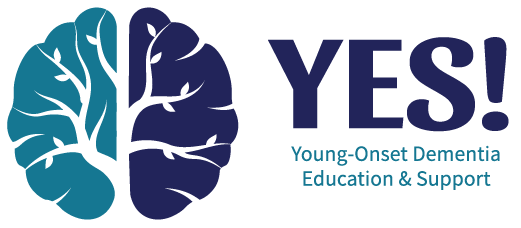Life interrupted by Young Onset Dementia & the Associated Anticipatory Grief for Everyone Involved
By Dawn O’Meally, MSW, LCSW-C, and Nicholas O’Meally, MSW, LSW
Grief is often assumed to occur after a death, but what if it starts earlier? What if we know a loss is impending, and we begin to grieve before a loved one passes on? For many care partners, as well as people diagnosed with Young-Onset Dementia, this pre-death grief becomes reality when faced with future losses and death. This experience of grieving before a death occurs is called Anticipatory Grief (AG), and it can be a heavy burden for anyone impacted by Young Onset Dementia. It is the anticipation of death in the predeath grief continuum resulting from the diagnosis that there is no current “cure” for Dementia. Dementia, as we know, causes a plethora of progressive losses, past and future-especially for the young onset patients who are often in the prime of their lives.
What is the difference between grief and AG? Whereas grief is the experience of loss and is usually a singular event, AG is the experience of expected or anticipated loss(es) that can go on for years and can involve daily losses. AG can be a dark, painful, lonely, stressful and confusing period without a known end point that occurs during ‘real time’ and must be lived through until the end by everyone involved, i.e., the afflicted, the care partner, and the entire family. Conversely, AG can represent a period of transformation and an activation of strengths, a time of finding new meaning and purpose, a time of building new relationships, and a time for healing and forgiveness.
“Suffering ceases to be suffering the minute it finds meaning.”
~Viktor Frankel
AG can start the instant a loved one receives the diagnosis and may continue throughout the gradual decline of health. For care partners and those afflicted with Dementia, AG can also be characterized by the abilities, relationships, and identities they know will be lost as the condition progresses. Throughout the journey of Young Onset Dementia, both care partners and the afflicted can face multiple tangible and relational losses. When first diagnosed, the immediate anticipatory loss is that of the future. Care partners and their families can go from anticipating a long life with their loved ones to anticipating a decline of health and death. They may also anticipate the loss of financial stability, dreams for the future with their loved one, losing a co-parent and having to become a single parent, family traditions, careers, privacy, intimacy, traditions, familial roles, independence, spirituality, and friendships.
The person who receives a diagnosis of Dementia can also experience AG and may grieve the eventual loss of both cognitive and physical functions. From the earliest stages of Dementia, those impacted by the condition may begin to grieve a future where they anticipate that they may be unable to recognize their loved ones as well. The afflicted may anticipate the same losses as caregivers, but they have the unique loss that is their own identity. They may grieve a future where they no longer know themselves or the memories that helped shape them. Compounded with these feelings is the inevitable loss of control over one’s body and the anticipation of a future where they have to live, in spite of this loss.
During AG, care partners and their families can, and do, experience all of the same mixed and sometimes overwhelming emotions commonly associated with persons going through grief: anger, anxiety, resentment, sadness, denial, fear, guilt, relief, joy, loneliness, longing, love, hopelessness, numbing, and more. It is normal to experience more than one emotion at the same time. For example, one may feel happiness during moments of lucidity but sadness about the reality of the situation. While living through the process of AG, emotions can change from moment to moment for everyone involved since the experience of living with someone suffering with Dementia can be like living in the midst of a moving target.
“No one ever told me that Anticipatory (word interjected by writers) Grief felt so much like Fear”
C.S. Lewis
While everyone impacted by Young-Onset Dementia recognizes that nothing can take away the pain of anticipatory losses, they can also cope and achieve meaning making by using various strategies. For care partners, their families, and the afflicted, the following strategies may provide some comfort during the difficult period of AG:
- Continue to attend family and social gatherings. Avoid social isolation.
- Talk to loved ones and friends about the challenges of experiencing Young-Onset Dementia and caregiving. Tell your story.
- Take pictures and videos to preserve the moments and memories.
- Use the Serenity Prayer
- Allow yourself to vocalize feelings to those you trust and know will listen.
- Actively mourn the losses that do occur; do not let grief fester as it can lead to clinical depression, anxiety, substance abuse, health issues, as well as impact negatively on your relationships.
- Take breaks, rest, and continue to nourish yourself throughout the caregiving process.
- Give yourself the grace you deserve and would freely give to someone you love going through a similar situation.
- Write letters to one another expressing feelings, hopes, and reflections on life spent together.
- Find others afflicted and caregiving through young onset support groups, community events, online groups through Meetup.com, www.grief.com, the Alzheimer’s Association, and non-profits like YES!
- Learn and practice mindfulness meditations and skills to find peace in moments of distress.
- Understand that it is okay to have whatever feelings come to you throughout the process.
- Practice gratitude
- Journaling, art, grief yoga
- Workbooks such as “Transforming Grief and Loss” by Ligia M. Houben, “The Dementia Care Partner’s Workbook” by Dr. Edward G. Shaw, and “Expected Loss, Coping with Anticipatory Grief” by Alan D. Wolfelt, Ph.D., may be helpful resources.
- Use affirmations, readings, and quotes that nourish and empower you to keep going
- Seek professional counseling and/or spiritual pastoral care
Finally, remember that everyone impacted by Young-Onset Dementia has a right to mourn openly and to discuss his or her grief. While traversing the wilderness of anticipated grief and illness, know that there are no “right or wrong” emotions. There will always be limits to our emotional, spiritual, and physical wellbeing, and it is necessary to honor them for self-preservation. Everyone will mourn and experience grief differently, and everyone has a right to explore comfort and meaning making differently as well. Though every incident of Young-Onset Dementia is different, sharing stories and listening to others afflicted can be effective means of processing loss. Anticipatory Grief is not a single event, but rather, an ongoing process. As such, everyone has the right to experience patience and compassion as they move forward at their own pace.
Co-Authored by Dawn O’Meally, Licensed Clinical Social Worker, owner of The Counseling Center for Change in Westminster, MD, YES! Board member and co-facilitator of YES! Men’s Support Group and Dawn’s son, Nicholas O’Meally, Licensed Social Worker and Bereavement Coordinator at the Visiting Nurses Association in Philadelphia, PA.
Both writers experienced the loss of Barbara O’Meally, Mother-in-law to Dawn and Grandmother to Nicholas to Alzheimer’s Disease on 10/21/19. They were happy to come together to create this article and have heartfelt hope that readers will benefit from it.

